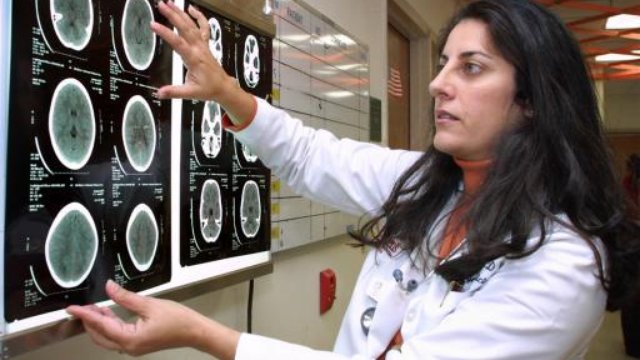Scottish cancer deaths rise to 25-year high
30 October 2018, 18:15 | Updated: 30 October 2018, 18:19

Cancer charities are demanding the number of staff in the NHS is increased "urgently" after new figures showed a rise in deaths from the disease last year.
A total of 16,105 deaths were caused by cancer in Scotland in 2017, up from 15,813 the previous year.
While the total number of cancer deaths reached its highest for 25 years, overall mortality rates from the disease have fallen by 10% in the last decade - going from 358 deaths per 100,000 people in 2007 to 321 deaths per 100,000 in 2017.
But with more Scots living longer, increasing numbers are developing the disease.
Gregor McNie, Cancer Research UK's head of external affairs in Scotland, said: "It's clear cancer continues to have a devastating impact in Scotland.
"Thanks to advances in research, new and better treatments are coming on stream which will help more people survive.
"Too many people are diagnosed when their cancer has already spread and is harder to treat. If we can diagnose more cancers earlier, it's likely more people will survive. To do this, we need to make sure that people with suspected cancer are offered the right tests.
"We know staff shortages are currently having an impact on patients receiving efficient access to diagnostic tests. We'd urge the Scottish Government to urgently progress its plans to employ more people."
Five types of the disease - lung cancer, bowel cancer, prostate cancer, breast cancer and oesophageal cancer - were responsible for more than half of all cancer deaths in Scotland last year, with lung cancer killing 4,069 alone.
While official NHS figures showed the overall cancer mortality rate had fallen by 12% for males and 7% for females over the last 10 years, there was a 60% rise in the mortality rate for liver cancer over the period.
Death rates for the disease - which is linked to both obesity and alcohol consumption - increased by 47% for men and 93% for women.
However the mortality rate for females due to breast cancer fell by 17% over the decade, with the rate of male deaths from stomach cancer down by 33% over the period 2007 to 2017.
Meanwhile cancer death rates in the most deprived parts of Scotland were 76% higher than they were in the least deprived communities.
Gordon McLean, of Macmillan Cancer Support, said: "The picture in deprived areas continues to be incredibly concerning.
"It is simply not right that those in the most deprived areas of Scotland are most likely to get cancer and most likely to die of it."
Conservative health spokesman Miles Briggs said even with an ageing population, the number of cancer deaths "must still be cause for concern".
He stated: "Every month we see hospitals struggling to see cancer patients on time, meaning efforts to treat the disease early are often undermined.
"That can be the difference between life and death, and needs to improve as a matter of urgency."
Labour health spokeswoman Monica Lennon said: "Many people are surviving and living well after cancer thanks to advances in treatment and our dedicated NHS staff.
"However, if you are poor you are increasingly more likely to get cancer and die and these new statistics sadly prove that SNP ministers have failed to make Scotland a healthier or more equal country.
"These figures show the urgent need to end austerity and instead invest in communities with the goal of eradicating poverty and inequality."
Health Secretary Jeane Freeman said the "encouraging" drop in the cancer mortality rate over the last 10 years was "a reflection of the fact that more people are surviving cancer as a result of early detection and better treatment methods".
She added: "In particular I welcome the decrease in the breast cancer mortality rate, which has gone down by 17.2% for women in the last decade.
"Last week we published our Waiting Times Improvement Plan, backed with more than £850 million of funding. This plan aims to substantially and sustainably reduce waiting times across the system, with a particular focus on those requiring cancer treatment.
"As the plan outlines, we will maintain our performance against the 31 day standard for treatment of cancer, and increase diagnostic capacity to improve performance on the 62 day standard for those with a suspicion of cancer.
"Our £42 million Detect Cancer Early Programme demonstrates our commitment to early detection - aiming to increase the proportion of Scotland's most common cancers (breast, bowel and lung cancers) detected at an early stage."






